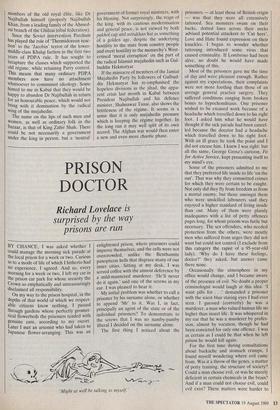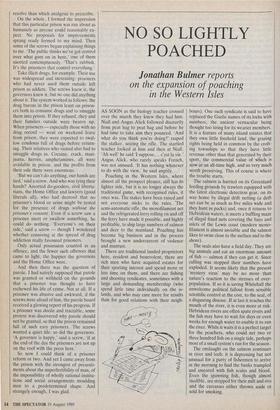PRISON DOCTOR
Richard Lovelace is
surprised by the way prisons are run
BY CHANCE, I was asked whether I could manage the morning sick parade-at the local prison for a week or two. Curious as to a mode of life of which I hitherto had no experience, I agreed. And so, every morning for a week or two, I left my car in the prison car park for whose security the Crown so emphatically and unreassuringly disclaimed all responsibility.
On my way to the prison hospital, in the depths of that world of which we respect- able citizens know nothing, I passed through gardens whose perfectly geomet- rical flowerbeds the prisoners tended with genuine care, according to my escort. Later I met an arsonist who had taken to Japanese flower-arranging. This was an enlightened prison, where prisoners could improve themselves, and the cells were not overcrowded, unlike the Benthamite panopticon hells that disgrace many of our inner cities. Sitting at my desk, I was served coffee with the utmost deference by a mild-mannered murderer. 'He'll never do it again,' said one of the screws in my ear. I was pleased to hear it.
My initial problem was whether to call a prisoner by his surname alone, or whether to append 'Mr' to it. Was I, in fact, principally an agent of the state or of the individual prisoners? To demonstrate to the screws that I was no namby-pamby liberal I decided on the surname alone.
The first thing I noticed about the `Might as well be talking to myself' prisoners — at least those of British origin — was that they were all extensively tattooed. Sea monsters swam on their backs, dotted lines across their necks advised potential attackers to 'Cut here', Love and Hate found expression on their knuckles. I • began to wonder whether tattooing introduced some virus that caused criminality. If Lombroso had been alive, no doubt he would have made something of this.
Most of the prisoners gave me the time of day and were pleasant enough. Rather against my expectations, their complaints were not more footling than those of an average general practice surgery. They suffered conditions ranging from broken bones to hypochondriasis. One prisoner wished to be excused work because of a headache which travelled down to his right foot. I asked him what he would have thought if the sick parade had been cancel- led because the docctor had a headache which travelled down to his right foot. With an ill grace he took the point and I did not excuse him. I knew I was right: but all the same, George Grosz's cartoon, Fit for Active Service, kept presenting itself to my mind's eye.
Some of the prisoners admitted to me that they preferred life inside to life 'on the out'. That was why they committed crimes for which they were certain to be caught. Not only did they fly from freedom as from a mortal enemy, but those amongst them who were unskilled labourers said they enjoyed a higher standard of living inside than out. Many of them were plainly inadequates with a list of petty offences pages long, for whom prisom was futile but necessary. The sex offenders, who needed protection from the others, were mostly men who suffered from urges they did not want but could not control (I exclude from this category the rapist of a 95-year-old lady). 'Why do I have these feelings, doctor?' they • asked, but answer came there none.
Occasionally the atmosphere in my office would change, and I became aware of the presence of evil. No doubt a proper criminologist would laugh at this idea. want pills for . . .' demanded a prisoner with the iciest blue staring eyes I had ever seen. I guessed (correctly) he was a murderer, a man who valued human life no higher than insect life. It was whispered in my ear that he was a murderer by profes- sion, almost by vocation, though he had been convicted for only one offence. I was as certain as I could be that when he left prison he would kill again.
For the first time during consultations about backache and stomach cramps, I found myself wondering where evil came from. Was it a throw of the genes, a matter of potty training, the structure of society? Could a man choose evil, or was he merely deficient in certain chemicals in the brain? And if a man could not choose evil, could evil exist? These matters were harder to resolve than which analgesic to prescribe.
On the whole, I formed the impression that this particular prison was run about as humanely as anyone could reasonably ex- pect. No proposals for improvements sprang ready formed to my mind. Then some of the screws began explaining things to me. 'The public thinks we've got control over what goes on in here,' one of them snorted contemptuously. 'That's rubbish. It's the prisoners that control everything.'
Take illicit drugs, for example. Their use was widespread and increasing: prisoners who had never used them outside left prison as addicts. The screws knew it, the governors knew it, but no one did anything about it. The system worked as follows: the drug barons in the prison leant on prison- ers both to consume drugs and to smuggle them into prison. If they refused, they and their families outside were beaten up. When prisoners — especially those with no drug record — went on weekend leave from prison, they were expected to swal- low condoms full of drugs before return- ing. Their relatives who visited also had to smuggle drugs in. Cocaine, crack, mari- juana, heroin, amphetamines, all were available in prison, and the profits from their sale there were enormous.
`But we can't do anything, our hands are tied,' said a screw. And who was tying their hands? Assorted do-gooders, civil liberta- rians, the Home Office and lawyers (good liberals all), who had decreed that no prisoner's blood or urine might be tested for the presence of drugs without the prisoner's consent. Even if a screw saw a prisoner snort or swallow something, he could do nothing. 'Everyone's on their side,' said a screw — though I wondered whether conniving at the spread of drug addiction really favoured prisoners.
Only actual possession counted as an offence, and the fewer such offences that came to light, the happier the governors and the Home Office were.
And then there was the question of parole. I had naïvely supposed that parole was granted or withheld on the grounds that a prisoner was thought to have eschewed his life of crime. Not at all. If a prisoner was abusive and awkward, if the screws were afraid of him, the parole board received a glowing report of his progress. If a prisoner was docile and tractable, some pretext was discovered why parole should not be granted, so that the prison remained full of such easy prisoners. The screws wanted a quiet life: so did the governors. `A governor is happy,' said a screw, 'if at the end of the day the prisoners are not up on the roof with the press here.'
So now I could think of a prisoner reform or two. And yet I came away .from the prison with the strongest of presenti- ments about the imperfectibility of man, of the impossibility of wholly rational institu- tions and social arrangements moulding men to a predetermined shape. And strangely enough, I was glad.



















































 Previous page
Previous page